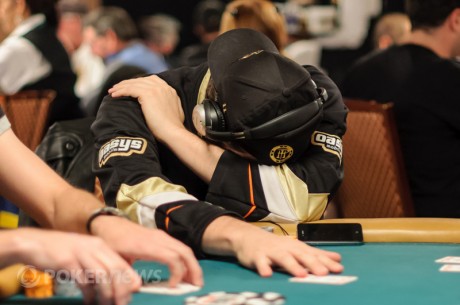The Poker Shrink, Vol 10 - Overreaction & Under Reaction to the Internet Gaming Bill

How many times have you seen someone yelling at their husband or girlfriend or kids and thought: "He's nuts." or "That woman is crazy." We all tend to identify and label behavior that is "too" loud or "too" bizarre or "too" anything. You see we all have a fairly uniform definition of what is normal and therefore what is abnormal. The overwhelming number of people are normal and not mentally deranged but we all sometimes act outside the norm.
"It was a crazy day."
"I just go nuts when I hear talk like that."
Now we don't actually meant that we, ourselves, are clinically mentally disturbed, well we don't mean that most of the time. But sometimes there are those events where a whole lot of us or a whole subset of us just get a bit crazy at the same time and often for the same reason. The Internet Gaming Bill passed by the U.S. Congress was one of those times for poker players. There were two extreme reactions to the passage of the bill and both exhibit behaviors that at least some of us, might want to reconsider.
The first reaction should be familiar to anyone reading this article, the world wide web went nuts! Forums, blogs, websites just freaked out over the both the passage of the bill and the late night political maneuvering that brought it to a vote. During that first weekend I spent several hours each night lurking in various online card rooms reading table chat on the Gaming Bill and invariably the reaction was vociferous, unanimous and in most cases had little or nothing to do with what the legislation was actually about. Once again "we" were using the faceless internet to go collectively "nuts" with very little information and even less reasoned, measured consideration of the actual facts.
I happened to be in Tunica, Mississippi when the Internet Gaming legislation passed; so I also got to listen to a fair amount of table talk in live games and tournaments. An informal survey of all sources had the "misinformation factor" on the legislation at well over 90%. However, to be fair there were some well reasoned analysis and commentary out there also.
The psychological question is: why do we react like this? The answer quite simply is that human beings are not fond of change and, in particular, not fond of change that reduces our options or current patterns of behavior. The scientific word for "everything just fine" is homeostasis. In psychological terms homeostasis means a state of psychological equilibrium obtained when tension or a drive has been reduced or eliminated. You want to play poker online; you play poker online. You want to play poker online; you can't play! Homeostasis disrupted and the subject reacts. But in this case the situation was: You want to play poker online; Congress passes a law that might prevent that and you ("we") go nuts!
This is an inappropriate emotional reaction to an event that may or may not have future consequences and yet the reaction is immediate, emotional and driven by misinformation. I would suggest that such a response is not only inappropriate but is not the cool, calm, measured response one would wish to cultivate in order to play top notch poker. The old poker axiom to remember here is: "Leave your emotions at the door."
However, overreaction to change is not the only psychological syndrome in play around the Internet Gaming Law. Just as strange and equally questionable is an under reaction to change, threat or trauma. Some of the online poker sites went just a bit crazy, in fact, as you know several had closed the accounts of U.S. players even before the legislation passed. On the other side of the aisle, several sites made strong statements about remaining open to U.S. players. However, as a group the online poker sites have done nearly nothing to lobby Congress on behalf of their business model. One has to wonder with the political realities of 21st century American politics why the online sites took such a passive approach to this threat to their companies and their futures. Overreaction in this case caused some sleepless nights for many players and those associated with the many small businesses that are part of the online poker phenomenon. Under reaction could cost a select group of site owners tens of millions of dollars in future financial gain.
I have to wonder if a more proactive response might not have been a wiser and sounder business and psychological decision for those intimately involved in the business of internet poker. For further counseling on the disadvantages of under reactive behavior, those online owners might wish to address an email to: [email protected]
Ed note: Homeo - what? You want to play online poker, play online poker at Ultimate Bet Sign up Today








